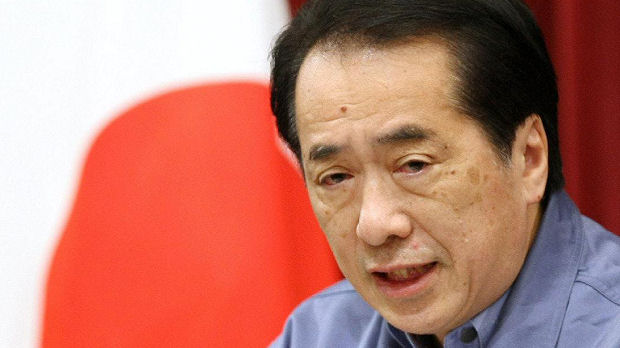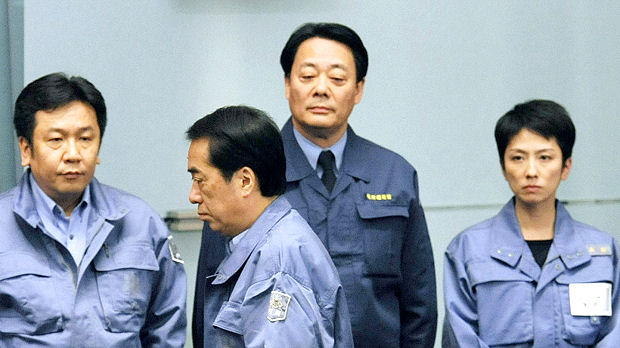Post-tsunami Japan looks to PM Kan for leadership
Will Japan premier Naoto Kan’s handling of the tsunami disaster mark him out as a great leader – or could events of the last few days do for him what Hurricane Katrina did for George W Bush?

Major events, whether natural or man-made, tend to define political careers.
9/11 gave George W Bush a huge electoral boost – one he squandered four years later with his ineffective reaction to Hurricane Katrina. Taiwain’s Typhoon Morakat not only claimed the lives of 500 people in 2009, it also claimed the political career of premier Liu Chao-shiuan.
As if aware of the political pitfalls offered up by disasters, New Zealand’s Prime Minister John Key has been a conspicuous presence as his country deals with the aftermath of last month’s earthquake in Christchurch.
So what can we judge so far from Japanese PM Naoto Kan’s response to the 11 March tsunami, to the nuclear threat, and to the human catastrophe that has followed?
We have to give Naoto Kan time – we don’t know the full scale of the disaster yet. Angus Lockyer, SOAS, London University
One thing that is clear is that the 64-year-old Kan – unlike, say, Junichiro Koizumi, Japan’s memorably long-haired prime minister who served between 2001 and 2006 – is not a man burdened by an excess of charisma. He is a long-time politician who has worked his way up the ranks. And like every politician who has been around for a while, he has endured success and failure.
In the months preceding Friday’s earthquake and tsunami, however, Kan’s career was heading downwards. Since he became leader of his country in June 2010, voter support for him and the centrist Democratic Party of Japan (DPJ), which he leads, had sunk to around 20 per cent.
Nor does Kan appear over-qualified to steer his Japan through what he described at the weekend at “the most severe crisis in the past 65 years, since world war two”. He served briefly as health minister as part of a coalition government in 1996, and led the DPJ for eight months between 1998 and 1999. In 2009 he became deputy prime minister, succeeding premier Yukio Hayotama last year.

However, some observers have been impressed by the way Kan and his colleagues have handled Japan’s tsunami and nuclear crisis. The prime minister ended yesterday’s news conference speech on an uncharacteristically emotional note, announcing: “We’re under scrutiny on whether we, the Japanese people, can overcome this crisis” and enjoining his countrymen and women to come together in their determination to rebuild the nation.
He has also announced that the authorities are considering using air and sea transport to take food, water and other necessities to the disaster area because of the damage to roads. The Japanese government has so far pledged £1.5bn to cope with the aftermath of the earthquake.
On Monday, Japan’s central bank injected £114bn into the banking system to stabilise the financial markets today (the Nikkei index nevertheless plummeted as markets assessed the devastation on the first trading day since the quake).
For the latest from Japan, go to our Channel 4 News Japan live blog
It remains to be seen whether last week’s tsunami becomes Kan’s “Katrina moment” or allows him to stake a claim to remain in office for a meaningful period (he is Japan’s fifth PM since 2006). Before last week he was embroiled in a scandal over a political donation he allegedly received from a foreign national – and now he is the focus of the world’s media.
What is more, Kan will – for the time being – enjoy the support of Japan’s Liberal Democratic Party, the country’s biggest opposition group. As Jun Okumura of the Eurasia Group told Bloomberg: “The thing going for him now is that the opposition can’t be in opposition.”
Dr Angus Lockyer, chair of the Japan Research Centre at London University’s School of Oriental and African Studies, told Channel 4 News that now was not the time to judge Kan: “We have to give him Naoto Kan time – we don’t know the full scale of the disaster yet. And we have to give the Japanese time to find solutions.
“Compared to what might have happened, both in terms of disaster and response, there’s a sense of resolution about Japan’s response so far which is quite impressive.”